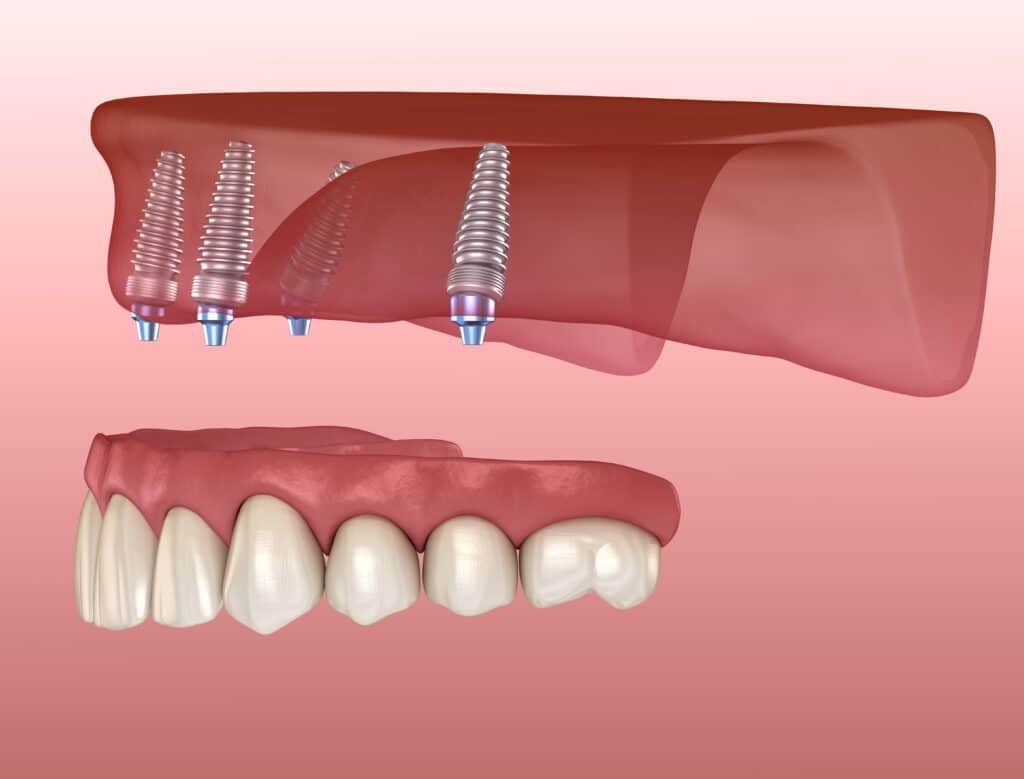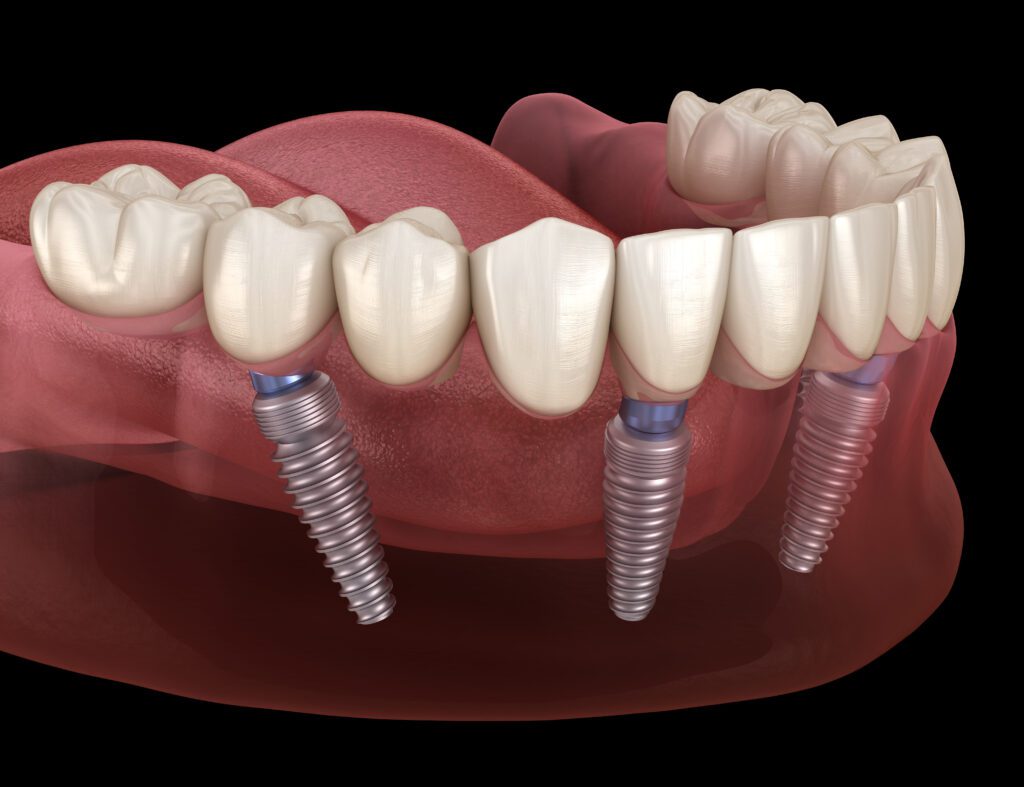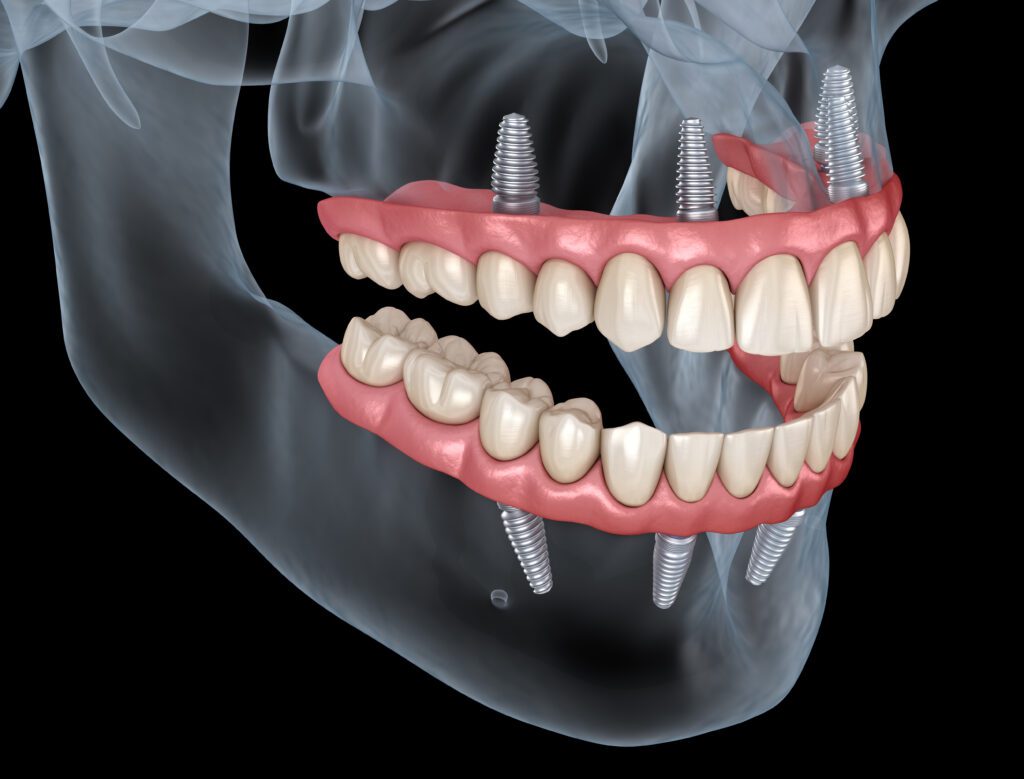Cases of severe to total tooth loss can range from embarrassing to devastating. It can make generic tasks such as eating or speaking difficult, and acts like smiling carry a weight of self-consciousness. Fortunately, there are several kinds of permanent solutions to tooth loss which replace full sets of teeth. Here we discuss the differences between all on 4 dental implants and other full mouth restorations.

The Need for Full Tooth Replacement
The reasons behind why people lose all their teeth are as varied and individual as the affected people themselves, but there are a few common denominators. Age and a history of poor dental hygiene are common contributors, but even events like dramatic accidents can result in total tooth loss. There are also a variety of conditions that may necessitate tooth replacement:
- Ectodermal Dysplasia: Affects teeth, skin, hair, nails, and sweat glands adversely
- Amelogenesis: Disrupts tooth development, often causing teeth to be abnormally small, pitted, and susceptible to ready wear or breakage
- Dentinogenesis Imperfecta: Inhibits proper tooth development, causing teeth to be discolored or translucent, abnormally weak, and at risk of breakage or loss
No matter the cause of a patient’s complete tooth loss, full mouth reconstruction and all on 4 dental implants are available to restore beauty, functionality, and a sense of confidence.
Complete Tooth Replacement Solutions
While more surface-level solutions are available for those looking to improve the appearance of their teeth, those looking for true tooth replacement solutions should consider dental implants.

Full Mouth Restorations
Full mouth dental restorations provide a dental implant solution that is thorough, completely rebuilding or replacing all of a person’s teeth. The procedure combines esthetics with the science of restorative dentistry, producing satisfactory and beautiful results that restore patients’ functionality and improve dental health.
Full mouth restorations install dental implants to completely replace lost teeth. As with all dental implants, titanium posts—capped with faux teeth—are screwed into the jawbone. The titanium actually bonds to the jawbone, creating strong faux roots that support remarkably real-looking porcelain crowns. These function just like traditional teeth.
When a full set of implants is called for, it is typical for 8-10 implants to be installed per jaw. These are installed one at a time, allowing the jaw to heal between procedures. Because of this, the full mouth restoration process commonly takes anywhere from six months to a year to complete. Dentures for still toothless regions can be worn in the interim.
Aside from the sheer amount of time it takes to complete full mouth restorations, their biggest drawback is the strain it puts on the mouth and body in general. In addition to the healing processes required which can take its toll on the body’s energy reserves, having 8-10 implants drilled into the jaw is a lot for the mouth to take.
All on 4 Dental Implants
All on 4 dental implants are designed to still provide the functionality and beauty of complete implant replacements while putting less strain on the jaw. Instead of the 8–10 implants typical of full mouth restorations, all on 4 dental implants only use four implants per jaw. These are placed at an angle to secure a full set of upper or lower prosthetic teeth.
When installing all on 4 dental implants, the dentist adds the titanium posts in the sturdiest parts of the jawbone. This usually negates the need for bone grafting (taking portions of bone from one area of the jaw and using them to support areas receiving implants). The procedure is performed in one setting, the dentist adding all four posts (and the full set of prostheses) at once. Because of this, the process is significantly faster than receiving a full mouth restoration.

All dental implants can help prevent bone loss, which occurs when periodontal bone recedes without the support of dental roots. They can also prevent a person’s cheeks from a “sunken in” appearance. Even better, all on 4 dental implants alone can be installed even when bone loss has become extreme because the implants are angled. The accelerated nature of their installation also means that all on 4 dental implants are typically significantly less expensive than full dental implants, requiring fewer posts and fewer surgeries.
Dentures—A Temporary Solution
If you are looking for a non-permanent complete tooth replacement, dentures are also available. Made of resin or porcelain crowns atop a resin mouthpiece, dentures can provide a temporary solution while you wait for a more permanent fit. Dentures can aid in speaking and smiling, and they can fill out a face while they are worn, but dentures do not prevent bone loss because they are not installed into the jawbone.
